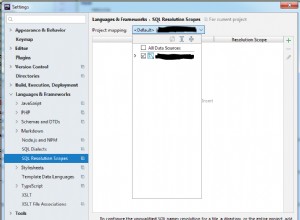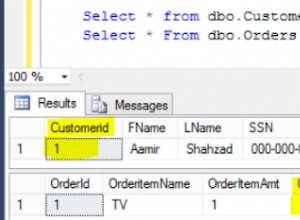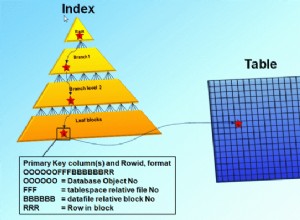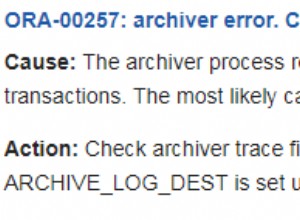Atualização:
Sim, podemos usar uma referência de cursor (SYS_REFCURSOR) e OPEN/FETCH/CLOSE em vez de um CURSOR e CURSOR FOR LOOP.
A sintaxe é
OPEN <cursor-reference> FOR <string-containing-sql-statement> . Veja abaixo. CREATE OR REPLACE FUNCTION load_test_object_sn
RETURN test_otable_sn
AS
details test_otable_sn := test_otable_sn();
-- Variable stores SQL statement for cursor
l_sql CLOB :=
q'[with ad as (
select 'a' column_1, 'b' column_2, 4 column_3 from dual union all
select 'r', '5', 3 from dual union all
select 'g', 's', 3 from dual
)
select *
from ad]';
-- Cursor reference allows us to open cursor for SQL statement above
rc SYS_REFCURSOR;
-- Define object instance to store each row fetched from the cursor
l_obj test_object_sn := test_object_sn(NULL, NULL, NULL);
i PLS_INTEGER := 1;
BEGIN
-- Explicitly open, fetch from, and close the cursor
OPEN rc FOR l_sql;
LOOP
FETCH rc INTO l_obj.column_1, l_obj.column_2, l_obj.column_3;
EXIT WHEN rc%NOTFOUND;
details.extend();
details(i) := test_object_sn(l_obj.column_1, l_obj.column_2, l_obj.column_3);
i := i + 1;
END LOOP;
CLOSE rc;
RETURN details;
END;
Resposta original:
Infelizmente, não é possível usar SELECT * INTO com uma coleção dessa maneira, então aqui está uma maneira alternativa de preencher a tabela:
create or replace function load_test_object_sn
return test_otable_sn
as
details test_otable_sn := test_otable_sn();
cursor c_ad is
with ad as (select 'a' column_1, 'b' column_2, 4 column_3 from dual
union all
select 'r', '5', 3 from dual
union all
select 'g', 's', 3 from dual)
select * from ad;
i pls_integer := 1;
begin
for ad_rec in c_ad loop
details.extend();
details(i) := test_object_sn(ad_rec.column_1, ad_rec.column_2, ad_rec.column_3);
i := i + 1;
end loop;
return details;
end;
/
Resultado:
SQL> SELECT * FROM TABLE(load_test_object_sn);
COLUMN_1 COLUMN_2 COLUMN_3
---------- ---------- ----------
a b 4
r 5 3
g s 3




